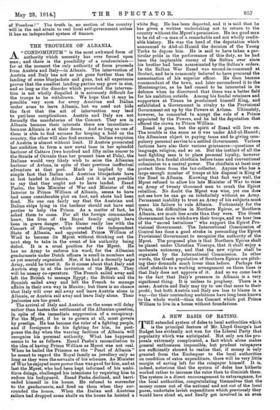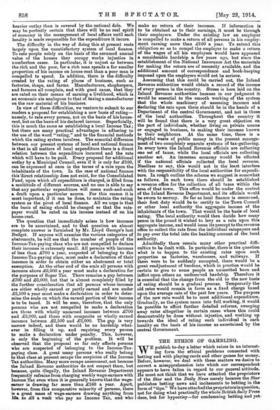A NEW BASIS OF RATING.
THE extended system of doles to local authorities which is the principal feature of Mr. Lloyd George's last Budget has evidently not won for the Liberal Party that popularity which was anticipated. Not only are the pro- posals extremely complicated, a fact which alone makes general enthusiasm impossible, but prudent ratepayers are sufficiently shrewd to realize that, if money is only granted from the Exchequer to the local authorities on condition of extra expenditure, there will be very little margin of saving left for the ratepayer himself. It is, indeed, notorious that the system of doles has hitherto worked rather to increase the rates than to diminish them. The system is a direct encouragement to extravagance, for the local authorities, congratulating themselves that the money comes out of the national and not out of the local purse, undertake lavish expenditure which previously they would have, shied at, and finally get involved in an even
heavier outlay than is covered by the national dole. We may be perfectly certain that there will be no real spirit of economy in the management of local affairs until each locality is made responsible for the expenditure it incurs.
The difficulty in the way of doing this at present rests largely upon the unsatisfactory system of local finance. To rate people solely on the basis of the assumed annual value of the houses they occupy works injustice in numberless cases. In particular, it is unjust as between the rich and the poor, for a rich man spends a far smaller proportion of his income on house-rent than a poor man is compelled to spend. In addition, there is the difficulty created by the rating of places of business, such as factories, shops, and farms. Manufacturers, shopkeepers, and farmers all complain, and with good cause, that they are rated on their means of earning a livelihood, which is an economic sin analogous to that of taxing a manufacturer on the raw material of his business.
In view of these difficulties, we venture to submit to our readers a proposal for establishing a new basis of rating— namely, to rate every person, not on the basis of his house- rent, but on the basis of his declared income. Superficially, this is much the same as establishing a local Income Tax; but there are many practical advantages in adhering to the use of the word "rating," and to the financial methods which the rating system involves. The essential difference between our present systems of local and national finance is that in all matters of local expenditure there is a direct relation between the expenditure incurred and the rate which will have to be paid. Every proposal for additional outlay by a Municipal Council, even if it is only for £100, can be expressed at once in the terms of a rate upon the inhabitants of the town. In the case of national finance this'direct relationship does not exist, for the Consolidated Fund, upon which all expenditure is charged, is filled from a multitude of different sources, and no one is able to say that any particular expenditure will mean such-and-such a draft upon a particular source. For this reason it is most important, if it can be done, to maintain the rating system as the pivot of local finance. All we urge is that the basis of rating should be changed so that the rate- payer would 'be rated on his income instead of on his house-rent.
The question that immediately arises is how incomes are to be ascertained, and to that question an almost complete answer is furnished by Mr. Lloyd George's last Budget. If anyone will examine the various categories of abatements, he will see that the number of people of the Income-Tax-paying class who are not compelled to declare their incomes is extremely small. All persons with incomes of less than £700 a year, suspected of belonging to the Income-Tax-paying class, must make a declaration of their incomes in order to obtain either an abatement or total exemption. At the other end of the scale all persons with incomes above £3,000 a year must make a declaration for the purposes of Super Tax. There remains a gap between £700 and £3,000, but that is almost completely filled by the further consideration that all persons whose incomes are either wholly earned or partly earned and are under .22,500 a year must make a declaration in order to deter- mine the scale on which the earned portion of their income is to be taxed. It will be seen, therefore, that the only persons who are not compelled to make a declaration are those with wholly unearned incomes between £700 and £3,000, and those with composite or wholly earned incomes between £2,500 and £3,000. The gap is very narrow indeed, and there would be no hardship what- ever in filling it up, and requiring every person to make a declaration under penalty. This, however, is only the beginning of the problem. It will be observed that the proposal so far only affects persons who are suspected of belonging to the Income-Tax- paying class. A great many persons who really belong to that class at present escape the suspicion of the Income Tax authorities. Many more escape assessment, not because the Inland Revenue authorities do not suspect them, but because, quite illegally, the Inland Revenue Department frequently refrains from charging weekly wage-earners with Income Tax even when it is generally known that the wage- earner is drawing far more than £160 a year. Apart, however, from this comparative minority of persons, there is a great mass of wage-earners drawing anything from 10s. to £3 a week who pay no Income Tax, and who
make no return of their incomes. If information is to be obtained as to their earnings, it must be through their employers. Under the existing law an employer is compelled to make a return of all persons in his employ- ment earning more than £160 a year. To extend this obligation so as to compel the employer to make a return of the wages of all his employees would have appeared a considerable hardship a few years ago, but since the establishment of the National Insurance Act the materials for making the return are of necessity available, and the additional amount of correspondence and book-keeping imposed upon the employers would not be serious.
Assuming that this could be carried out, the Inland Revenue authorities would obtain a record of the income of every person in the country. Stress is here laid on the Inland Revenue authorities because in our judgment it would be essential to the smooth working of the system that the whole machinery of assessing incomes and declaring the rate upon them should be in the hands of a Department of the central Government, and not in those of the local authorities. Throughout the country it will be found that there is a very great objection on the part of individuals, whether living on private means or engaged in business, to making their incomes known to their neighbours. At the same time, there is a frightful waste of public money in the present manage- ment of two completely separate systems of tax-gathering. In every town the Inland Revenue officials are collecting one set of taxes, while the local officials are collecting another set. An immense economy would be effected if the national officials collected the local revenue. Needless to say, this would not in the least interfere with the responsibility of the local authorities for expendi- ture. In rough outline the scheme we suggest is somewhat as follows. In each town there should be established a revenue office for the collection of all taxes within the area of that town. This office would be under the control of the Inland Revenue Department, and its officials would be sworn to secrecy. So far as local finance is concerned, their first duty would be to certify to the Town Council or other local authority the aggregate income of the inhabitants of the town. That would be the basis of local rating. The local authority would then decide how many pence in the pound it wished to levy as a rate upon this aggregate income, and would issue its precept to the revenue office to collect the rate from the individual ratepayers and to pay over the total into the banking account of the local authority. Admittedly there remain many other practical diffi- culties to be dealt with. In particular, there is the question what is to happen to the existing rates upon such properties as factories, warehouses, and railways. If these were to be suddenly exempted, there would be a great readjustment of burdens, which in practice would be certain to give to some people an unmerited boon and inflict upon others an undeserved hardship. Therefore it is essential that the change from the old to the new basis of rating should be a gradual process. Temporarily the old rates would remain in force as a fixed charge based upon the average rate of the past few years. The purpose of the new rate would be to meet additional expenditure. Gradually, as the system came into full working, it would be possible to effect further detailed. reforms, sweeping away rates altogether in certain cases where this could. demonstrably be done without injustice, and working up towards the ideal of rating each individual in each locality on the basis of his income as ascertained. by the central Government.















































 Previous page
Previous page